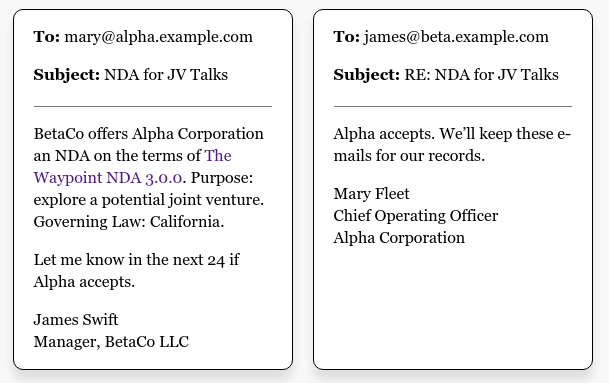Contract by E-Mailcontract power is in your hands
We’ve just added a new way to make NDAs to the top of waypointnda.com, the home of the standard-form Waypoint terms. Have a look at these mock e-mails:

Et voilà. It’s a contract. No clickwrap. No e-sig. No ink. No paper.
This isn’t science fiction. People can and do enter contracts via e-mail. And the courts enforce them. There are always exceptions, but as far as I know—and I’ve taken a good look—NDAs aren’t any one of them.
D.C. Toedt, who blogs at oncontracts.com, has been way out front on this. He’s even been teaching law students the mechanics, and for a while now. If you want the case law and statutory references to back all this up, go see his writing.
There are some things to keep in mind. When making contracts between companies or other organizations, you need to make clear the agreement is between legal entities, not individuals. You need to make sure the individuals agreeing on behalf of those legal entities—the ones sending the e-mails—have the legal power, or “authority”, to do so. Usually that means they need to be executive officers of the companies, with high-ranking titles like “President”, “CEO”, “COO”, “Managing Member”, and so on. Notice how the e-mails above clearly describe an agreement between companies. The manager of the LLC and the chief operating officer of the corporation do the offering and accepting.
You also need to make sure that the e-mails you are going to save as evidence of your deal make perfectly clear what terms were agreed. Fortunately, online, versioned forms like Waypoint make this easy and reliable. Just mention a specific version of the form, then add any details that need filling in, like purpose and governing law for Waypoint 3.0.0. Since the terms of that specific version will not change, there’s no question what terms were offered and accepted. Internet Archive has the page for posterity.
It wasn’t our intention to “support” agreement by e-mail in the recent 3.0.0 release. Our goal was just to make single-page documents that incorporate the legal terms by reference, rather than full packets attaching the terms, clearer and easier, so we could promote single-pagers as the default. But doing so meant stripping all mention of how the legal terms would be referenced and agreed out of the legal terms themselves.
When the law doesn’t require a specific way to prepare or sign a set of terms—as for real estate contracts—the terms shouldn’t be picky. There are many ways to make and document an agreement, from signing parchment in blood under seal to trading a couple quick e-mails on a Friday afternoon. None of them are magic. Very, very few of them require lawyers.
I look forward to promoting e-mail agreements for more terms, like Square One, in the near future.
Your thoughts and feedback are always welcome by e-mail.
